Unit2 Topic 3 Must we exercise to prevent the flu? Section A 课件(共39张PPT,内嵌音频)八年级英语上册 (仁爱版)
文档属性
| 名称 | Unit2 Topic 3 Must we exercise to prevent the flu? Section A 课件(共39张PPT,内嵌音频)八年级英语上册 (仁爱版) | 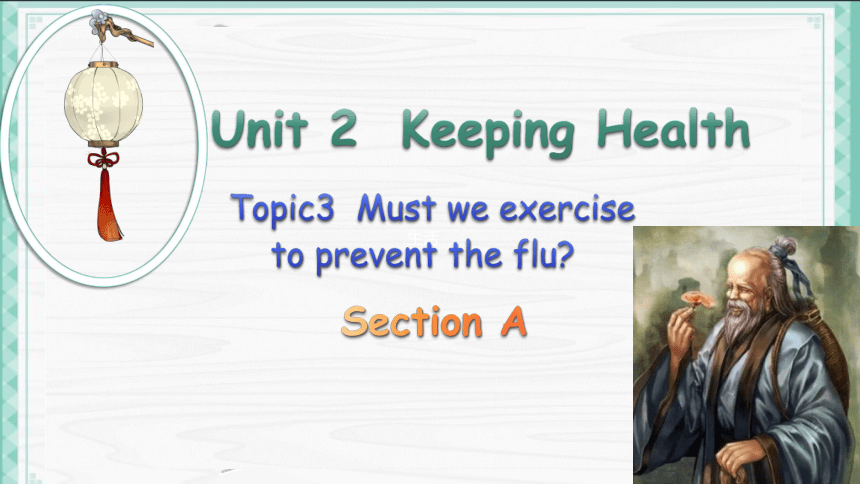 | |
| 格式 | pptx | ||
| 文件大小 | 36.4MB | ||
| 资源类型 | 教案 | ||
| 版本资源 | 仁爱科普版 | ||
| 科目 | 英语 | ||
| 更新时间 | 2023-10-13 20:09:28 | ||
图片预览

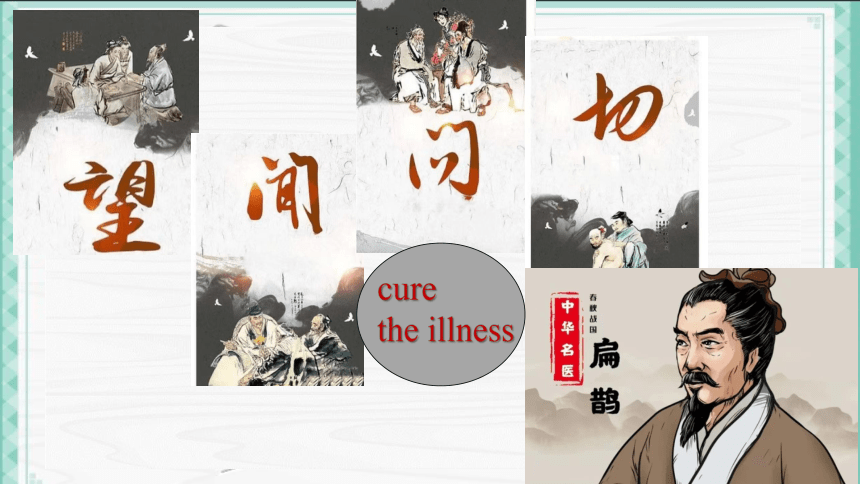
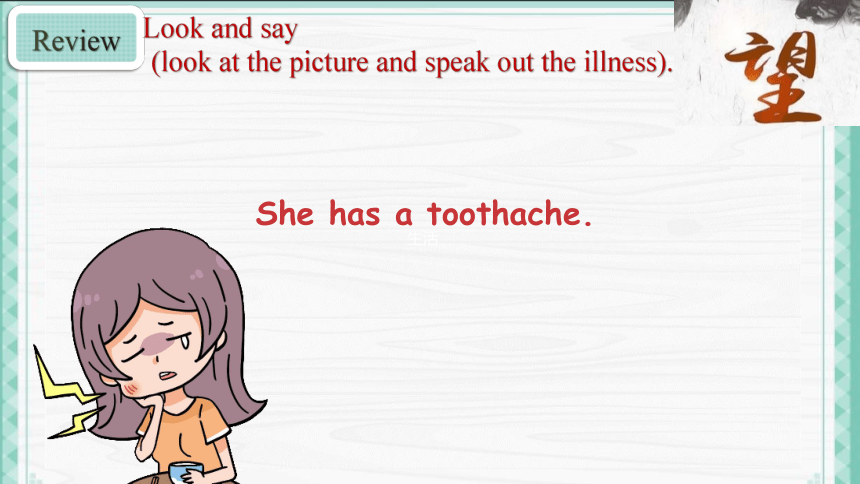
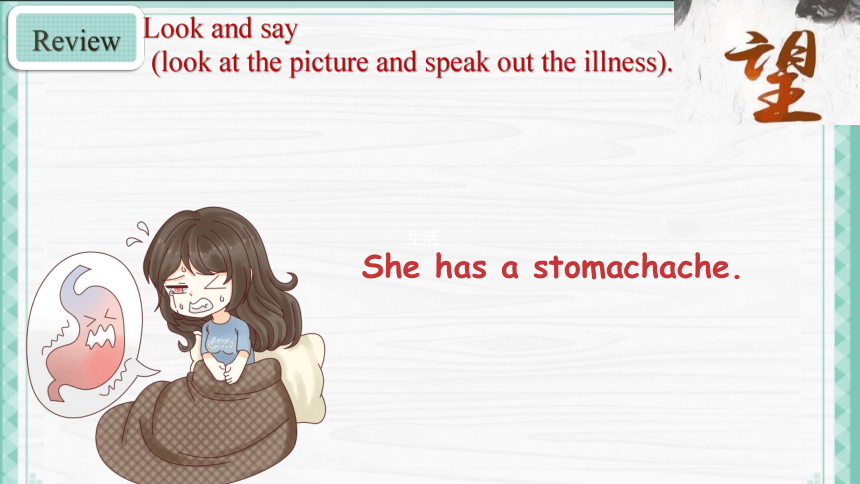
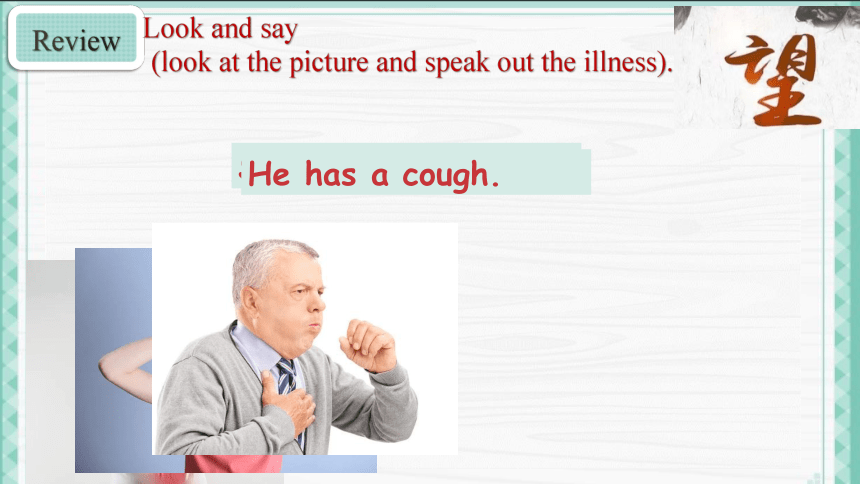
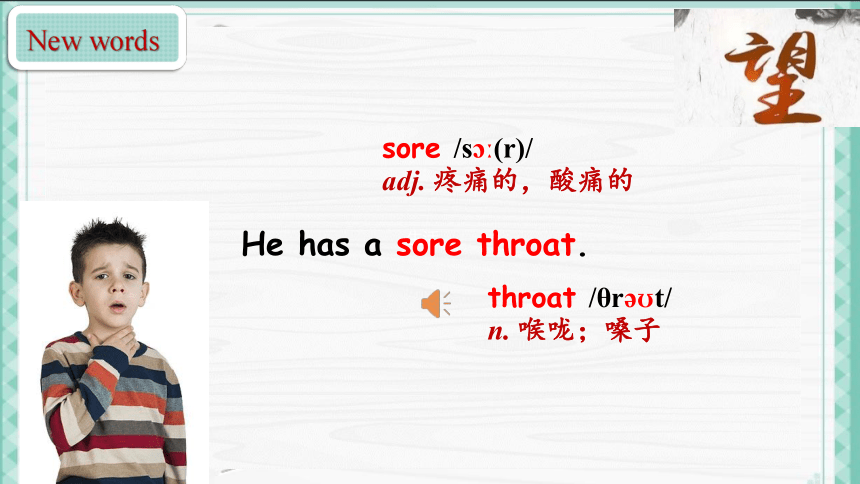
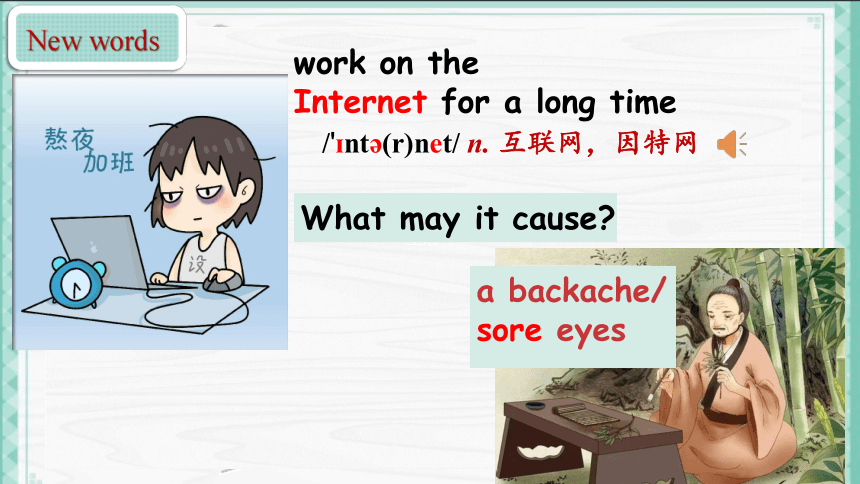
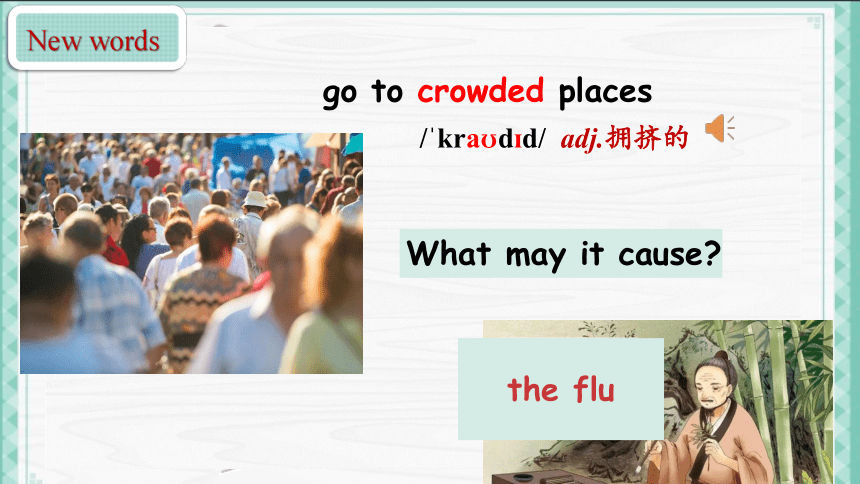
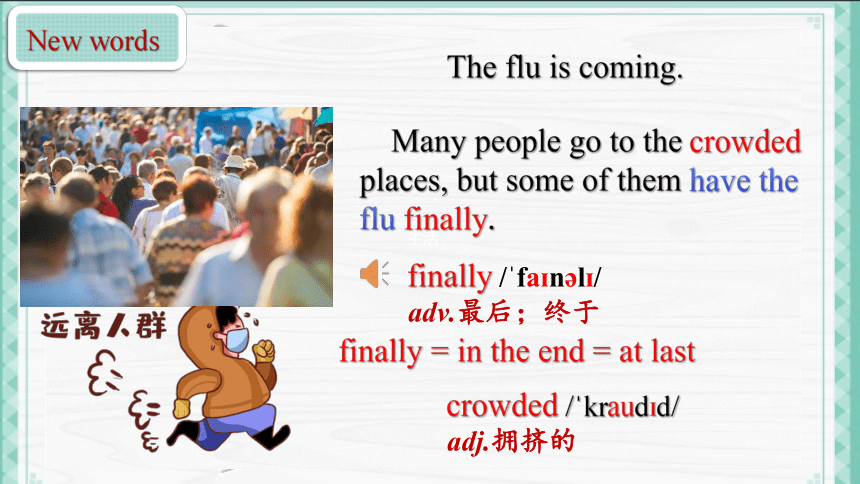
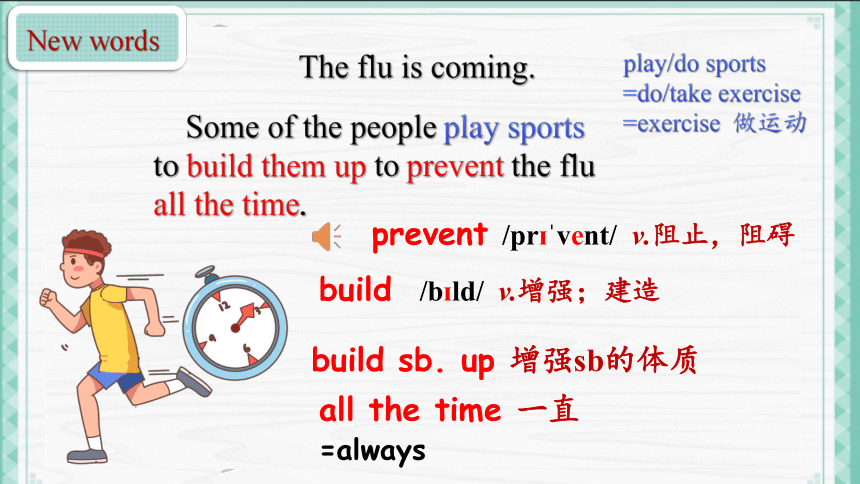
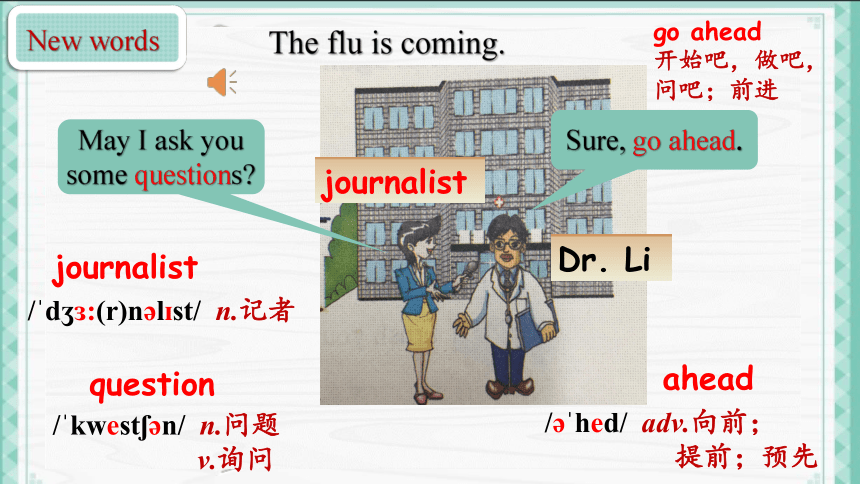
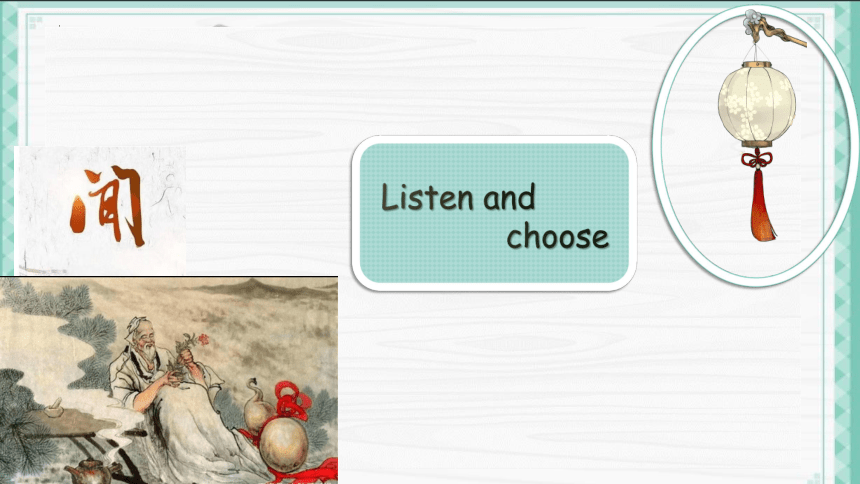
文档简介
(共39张PPT)
Unit 2 Keeping Health
Topic3 Must we exercise
to prevent the flu
Section A
cure
the illness
Review
Look and say
(look at the picture and speak out the illness).
She has a toothache.
Review
Look and say
(look at the picture and speak out the illness).
She has a stomachache.
Review
Look and say
(look at the picture and speak out the illness).
He has a backache.
She has a headache.
He has a cough.
New words
He has a sore throat.
sore /s (r)/
adj. 疼痛的,酸痛的
throat /θr t/
n. 喉咙;嗓子
New words
work on the
Internet for a long time
What may it cause
a backache/
sore eyes
/' nt (r)net/ n. 互联网,因特网
New words
go to crowded places
/ kra d d/ adj.拥挤的
What may it cause
the flu
New words
The flu is coming.
Many people go to the crowded places, but some of them have the flu finally.
finally / fa n l /
adv.最后;终于
finally = in the end = at last
crowded / kraud d/
adj.拥挤的
The flu is coming.
Some of the people play sports to build them up to prevent the flu all the time.
prevent /pr vent/ v.阻止,阻碍
New words
build /b ld/ v.增强;建造
build sb. up 增强sb的体质
all the time 一直
=always
play/do sports
=do/take exercise
=exercise 做运动
New words
The flu is coming.
May I ask you some questions
journalist
Dr. Li
Sure, go ahead.
journalist
/ d :(r)n l st/ n.记者
question
/ kwest n/ n.问题
v.询问
ahead
/ hed/ adv.向前;
提前;预先
go ahead
开始吧,做吧,
问吧;前进
Listen and
choose
1. The journalist is asking Dr.Li questions about
_______.
A.What causes the flu
B. How people can prevent the flu
C. What is the flu
2. Dr.Li gives _______ suggestions.
A.Three
B. Four
C. Five
Listen to 1a and choose.
B
B
如题2:first, second, third, finally
策略指导:
听对话时借助
衔接词!
1. exercise often
2. keep the air fresh
3. go to bed early.
4. wash hands and change clothes often
5. keep our rooms clean
6. drink enough water
7. take some medicine
8. keep away from crowded places
1b
Listen to 1a and check Dr. Li’s advice.
1a
Listen, look and say.
(Kangkang’s father, Dr. Li is talking with a journalist on TV.)
Journalist: May I ask you some questions, Dr. Li
Dr. Li: Sure, go ahead.
Journalist: These days many people have the flu.
So what should we do to prevent it
Dr. Li: Well, first, we should exercise often to build us up. Second, we should keep our rooms clean and the air fresh all the time. Third, we should wash our hands and change our clothes often. Finally, we should keep away from crowded places.
Journalist: Must we go to see a doctor at once when we have the flu
Dr. Li: Yes, we must.
Journalist: We’ll take your advice. Thank you.
Read 1a again and write down Dr. Li’s advice.
First, ________________________________________________
Second, ____________________________________________
Third, _______________________________________________
Finally, ______________________________________________
we should exercise often to build us up.
we should keep our rooms clean and the air fresh all the time.
we should wash our hands and change our clothes often.
we should keep away from crowded places.
Language points
考点:
(1)problem和question都当“问题”讲,但有区别。
problem通常指难以解决的问题,尤指比较困难的问题,如社会、政治、经济问题等。一般用work out/deal with/solve“解决”与problem搭配。
question常指对某事疑惑不解需要寻找答案的问题,常与动词ask“问”/answer“答”搭配。
(2)go ahead表示同意对方的请求,根据情况可译为“说吧!做吧!干吧!请吧!”等。
1. —May I ask you some questions, Dr. Li
我可以问你一些问题吗,李医生?
—Sure, go ahead. 当然可以,你问吧。
及时练习:选用problem或question填空。
1. Can you answer the _________
你能回答这个问题吗?
2. We must solve the ________ of heavy traffic in Beijing
as soon as possible.
我们必须尽快解决北京的交通拥挤问题。
3. This is a difficult _________ to answer.
这个问题很难回答。
4. —Can you help me —No __________. (没问题)
question
problem
question
problem
Language points
考点:
to prevetn it在句中作目的状语,也可以用“介词for+名词”表示目的,用What...for /What...to do /Why... 提问。
eg. They went to Yunnan for their holidays. 他们到云南去度假。
练习:I give flowers to my mom to show my love. (对划线部分提问)
_____ do you give flowers to your mom for/to do
_____ do you give flowers to your mom
拓展:
prevent/stop/keep sb. from doing sth. 阻止某人做某事
2. What should we do to prevent it 我们应该怎样预防流感呢?
What
Why
Language points
考点:
(1)build up“增强体质”,动副结构短语,人称代词放中间(且用宾格形式)。
eg. write them down 记下它们 turn it up 把它开大声点
(2)keep+adj.“保持......”
keep sb./sth.+adj.“使某人/某物保持......”
keep sb. doing sth.“让某人一直做某事”
(3)keep sth. for+一段时间“借某物多久”
You can keep the library book for a month.
3. We should exercise often to build us up. We should keep our rooms clean and the air fresh all the time. 我们应该经常锻炼增强我们的体质。我们应该一直保持房间清洁空气清新。
及时练习:
1. The father tries his best to prevent his son from
_______ (take) drugs.
2. Linda always keeps her bedroom _______ (clean).
3. —May I watch TV now
—Of course, ______.
A. go ahead B. go over C. come on D. you needn’t
taking
clean
A
Language points
考点:
(1)keep away from... (接名词、代词或动名词)
=don’t get close to... “远离......”
eg. We had better keep away from smoking and drinking.
我们最好远离吸烟和喝酒。
(2)crowded“拥挤的”
4. We should keep away from crowded places.
我们应该远离的地拥挤方。
Language points
考点:
take sb’s advice 采纳某人的建议
(1) advice是不可数名词,意为“意见、建议、劝告、忠告”,
不能与不定冠词a 连用。
eg. a piece of advice 一条建议
Let me give you some advice. 让我给你一些建议。
(2) advise是advice的动词形式,意为“建议”,
常用于advise sb. to do sth.的结构中。
eg. He _______ me ___ ______English every morning.
他建议我每天早晨读英语。
5. We’ll take your advice. 我们将会采纳你的建议。
advises to read
Ask and
answer
A: Must we exercise to prevent the flu
B: Yes, we must.
A: Must we take some medicine to prevent the flu
B: No, we don’t have to. / No, we needn’t.
1d
Make conversations similar to 1a, using the information in 1b.
1. exercise often 2. keep the air fresh
3. go to bed early. 4. wash hands and change clothes often
5. keep our rooms clean 6. drink enough water
7. take some medicine 8. keep away from crowded places
注意:此处不能用 mustn’t
(“禁止;不准”)回答。
Practice
Ask and answer.
What‘s wrong with her
She should drink enough boiled water and keep the air fresh all the time.
She has a fever.
What should she do
Practice
Ask and answer.
What‘s the matter with him
He had better go to bed early and exercise often.
He has a headache.
What should he do
Practice
Ask and answer.
She doesn’t feel good.
No, she needn’t./
No, she doesn’t have to.
Must she take some cold pills to prevent the flu
Yes, she must.
Must she keep away from crowded places
Language points
考点:情态动词的答语
(1)—Must I do...
—Yes, you must.
No, you needn’t./No, you don’t have to.
(2)—Need I do...
—Yes, you must.
No, you needn’t./No, you don’t have to.
(3) —Do I have to do...
—Yes, you do.
No, you don’t .
6. Must we exercise to prevent the flu
为了预防流感我们必须锻炼吗?
Language points
考点:
(4)—May I do...
—Yes, you may/can.
No, you can’t./No, you mustn’t.
注意:
must和have to都是“必须”的意思,但must侧重于个人意志和主观上的必须,无时态变化;而have to侧重于客观上的必要,可用于各种时态。
eg. You must take good care of your little brother.
Because of bad weather, we have to/had to/will have to stay at home.
6. Must we exercise to prevent the flu
为了预防流感我们必须锻炼吗?
及时练习:
1. —I can’t stop playing computer games.
—For your health, I’m afraid you ______.
A. can B. may C. must D. have to
2. You _____ lend(借出、借给)the library books to others.
A. must B. have to C. mustn’t D. don’t have to
3. —Must I do my homework now
—No, you ______.
A. must B. have to C. mustn’t D. don’t have to
D
C
D
2
A. Listen to the passage and circle the symptoms
that you hear.
headache
backache
toothache
stomachache
sore throat
sore eyes
fever
cough
B. Listen again and check the advice you hear.
Should
drink lots of boiled water
take some cold pills
lie down and take a good rest
brush your teeth twice a day
Shouldn’t
work on the Internet too long
go to crowded places
play sports too much
eat hot food
Look at the pictures and write down the advice on how to prevent the flu, using should, had better or must.
1.
2.
We should exercise often.
We must go to see
a doctor at once when we have the flu.
3
3.
4.
We had better keep away from crowded places.
We should take a
shower often.
5.
6.
We should keep
the air fresh.
We should change
our clothes often.
1.We know how to prevent the flu.
2.We can use must/had better/
should to give advice.
summary
Homework
1. Read 1a.
2. Recite the new words and expressions.
3. Finish Section A in your workbook.
4. Preview Section B.
Thank you!
Unit 2 Keeping Health
Topic3 Must we exercise
to prevent the flu
Section A
cure
the illness
Review
Look and say
(look at the picture and speak out the illness).
She has a toothache.
Review
Look and say
(look at the picture and speak out the illness).
She has a stomachache.
Review
Look and say
(look at the picture and speak out the illness).
He has a backache.
She has a headache.
He has a cough.
New words
He has a sore throat.
sore /s (r)/
adj. 疼痛的,酸痛的
throat /θr t/
n. 喉咙;嗓子
New words
work on the
Internet for a long time
What may it cause
a backache/
sore eyes
/' nt (r)net/ n. 互联网,因特网
New words
go to crowded places
/ kra d d/ adj.拥挤的
What may it cause
the flu
New words
The flu is coming.
Many people go to the crowded places, but some of them have the flu finally.
finally / fa n l /
adv.最后;终于
finally = in the end = at last
crowded / kraud d/
adj.拥挤的
The flu is coming.
Some of the people play sports to build them up to prevent the flu all the time.
prevent /pr vent/ v.阻止,阻碍
New words
build /b ld/ v.增强;建造
build sb. up 增强sb的体质
all the time 一直
=always
play/do sports
=do/take exercise
=exercise 做运动
New words
The flu is coming.
May I ask you some questions
journalist
Dr. Li
Sure, go ahead.
journalist
/ d :(r)n l st/ n.记者
question
/ kwest n/ n.问题
v.询问
ahead
/ hed/ adv.向前;
提前;预先
go ahead
开始吧,做吧,
问吧;前进
Listen and
choose
1. The journalist is asking Dr.Li questions about
_______.
A.What causes the flu
B. How people can prevent the flu
C. What is the flu
2. Dr.Li gives _______ suggestions.
A.Three
B. Four
C. Five
Listen to 1a and choose.
B
B
如题2:first, second, third, finally
策略指导:
听对话时借助
衔接词!
1. exercise often
2. keep the air fresh
3. go to bed early.
4. wash hands and change clothes often
5. keep our rooms clean
6. drink enough water
7. take some medicine
8. keep away from crowded places
1b
Listen to 1a and check Dr. Li’s advice.
1a
Listen, look and say.
(Kangkang’s father, Dr. Li is talking with a journalist on TV.)
Journalist: May I ask you some questions, Dr. Li
Dr. Li: Sure, go ahead.
Journalist: These days many people have the flu.
So what should we do to prevent it
Dr. Li: Well, first, we should exercise often to build us up. Second, we should keep our rooms clean and the air fresh all the time. Third, we should wash our hands and change our clothes often. Finally, we should keep away from crowded places.
Journalist: Must we go to see a doctor at once when we have the flu
Dr. Li: Yes, we must.
Journalist: We’ll take your advice. Thank you.
Read 1a again and write down Dr. Li’s advice.
First, ________________________________________________
Second, ____________________________________________
Third, _______________________________________________
Finally, ______________________________________________
we should exercise often to build us up.
we should keep our rooms clean and the air fresh all the time.
we should wash our hands and change our clothes often.
we should keep away from crowded places.
Language points
考点:
(1)problem和question都当“问题”讲,但有区别。
problem通常指难以解决的问题,尤指比较困难的问题,如社会、政治、经济问题等。一般用work out/deal with/solve“解决”与problem搭配。
question常指对某事疑惑不解需要寻找答案的问题,常与动词ask“问”/answer“答”搭配。
(2)go ahead表示同意对方的请求,根据情况可译为“说吧!做吧!干吧!请吧!”等。
1. —May I ask you some questions, Dr. Li
我可以问你一些问题吗,李医生?
—Sure, go ahead. 当然可以,你问吧。
及时练习:选用problem或question填空。
1. Can you answer the _________
你能回答这个问题吗?
2. We must solve the ________ of heavy traffic in Beijing
as soon as possible.
我们必须尽快解决北京的交通拥挤问题。
3. This is a difficult _________ to answer.
这个问题很难回答。
4. —Can you help me —No __________. (没问题)
question
problem
question
problem
Language points
考点:
to prevetn it在句中作目的状语,也可以用“介词for+名词”表示目的,用What...for /What...to do /Why... 提问。
eg. They went to Yunnan for their holidays. 他们到云南去度假。
练习:I give flowers to my mom to show my love. (对划线部分提问)
_____ do you give flowers to your mom for/to do
_____ do you give flowers to your mom
拓展:
prevent/stop/keep sb. from doing sth. 阻止某人做某事
2. What should we do to prevent it 我们应该怎样预防流感呢?
What
Why
Language points
考点:
(1)build up“增强体质”,动副结构短语,人称代词放中间(且用宾格形式)。
eg. write them down 记下它们 turn it up 把它开大声点
(2)keep+adj.“保持......”
keep sb./sth.+adj.“使某人/某物保持......”
keep sb. doing sth.“让某人一直做某事”
(3)keep sth. for+一段时间“借某物多久”
You can keep the library book for a month.
3. We should exercise often to build us up. We should keep our rooms clean and the air fresh all the time. 我们应该经常锻炼增强我们的体质。我们应该一直保持房间清洁空气清新。
及时练习:
1. The father tries his best to prevent his son from
_______ (take) drugs.
2. Linda always keeps her bedroom _______ (clean).
3. —May I watch TV now
—Of course, ______.
A. go ahead B. go over C. come on D. you needn’t
taking
clean
A
Language points
考点:
(1)keep away from... (接名词、代词或动名词)
=don’t get close to... “远离......”
eg. We had better keep away from smoking and drinking.
我们最好远离吸烟和喝酒。
(2)crowded“拥挤的”
4. We should keep away from crowded places.
我们应该远离的地拥挤方。
Language points
考点:
take sb’s advice 采纳某人的建议
(1) advice是不可数名词,意为“意见、建议、劝告、忠告”,
不能与不定冠词a 连用。
eg. a piece of advice 一条建议
Let me give you some advice. 让我给你一些建议。
(2) advise是advice的动词形式,意为“建议”,
常用于advise sb. to do sth.的结构中。
eg. He _______ me ___ ______English every morning.
他建议我每天早晨读英语。
5. We’ll take your advice. 我们将会采纳你的建议。
advises to read
Ask and
answer
A: Must we exercise to prevent the flu
B: Yes, we must.
A: Must we take some medicine to prevent the flu
B: No, we don’t have to. / No, we needn’t.
1d
Make conversations similar to 1a, using the information in 1b.
1. exercise often 2. keep the air fresh
3. go to bed early. 4. wash hands and change clothes often
5. keep our rooms clean 6. drink enough water
7. take some medicine 8. keep away from crowded places
注意:此处不能用 mustn’t
(“禁止;不准”)回答。
Practice
Ask and answer.
What‘s wrong with her
She should drink enough boiled water and keep the air fresh all the time.
She has a fever.
What should she do
Practice
Ask and answer.
What‘s the matter with him
He had better go to bed early and exercise often.
He has a headache.
What should he do
Practice
Ask and answer.
She doesn’t feel good.
No, she needn’t./
No, she doesn’t have to.
Must she take some cold pills to prevent the flu
Yes, she must.
Must she keep away from crowded places
Language points
考点:情态动词的答语
(1)—Must I do...
—Yes, you must.
No, you needn’t./No, you don’t have to.
(2)—Need I do...
—Yes, you must.
No, you needn’t./No, you don’t have to.
(3) —Do I have to do...
—Yes, you do.
No, you don’t .
6. Must we exercise to prevent the flu
为了预防流感我们必须锻炼吗?
Language points
考点:
(4)—May I do...
—Yes, you may/can.
No, you can’t./No, you mustn’t.
注意:
must和have to都是“必须”的意思,但must侧重于个人意志和主观上的必须,无时态变化;而have to侧重于客观上的必要,可用于各种时态。
eg. You must take good care of your little brother.
Because of bad weather, we have to/had to/will have to stay at home.
6. Must we exercise to prevent the flu
为了预防流感我们必须锻炼吗?
及时练习:
1. —I can’t stop playing computer games.
—For your health, I’m afraid you ______.
A. can B. may C. must D. have to
2. You _____ lend(借出、借给)the library books to others.
A. must B. have to C. mustn’t D. don’t have to
3. —Must I do my homework now
—No, you ______.
A. must B. have to C. mustn’t D. don’t have to
D
C
D
2
A. Listen to the passage and circle the symptoms
that you hear.
headache
backache
toothache
stomachache
sore throat
sore eyes
fever
cough
B. Listen again and check the advice you hear.
Should
drink lots of boiled water
take some cold pills
lie down and take a good rest
brush your teeth twice a day
Shouldn’t
work on the Internet too long
go to crowded places
play sports too much
eat hot food
Look at the pictures and write down the advice on how to prevent the flu, using should, had better or must.
1.
2.
We should exercise often.
We must go to see
a doctor at once when we have the flu.
3
3.
4.
We had better keep away from crowded places.
We should take a
shower often.
5.
6.
We should keep
the air fresh.
We should change
our clothes often.
1.We know how to prevent the flu.
2.We can use must/had better/
should to give advice.
summary
Homework
1. Read 1a.
2. Recite the new words and expressions.
3. Finish Section A in your workbook.
4. Preview Section B.
Thank you!
同课章节目录
- Unit 1 Playing Sports
- Topic 1 I'm going to play basketball.
- Topic 2 I'll kick you the ball again.
- Topic 3 The school sports meet is coming.
- Unit 2 Keeping Healthy
- Topic 1 You should brush your teeth twice a day.
- Topic 2 I must ask him to give up smoking.
- Topic 3 Must we exercise to prevent the flu?
- Unit 3 Our Hobbies
- Topic 1 What's your hobby?
- Topic 2 What sweet music!
- Topic 3 What were you doing at this time yesterday
- Unit 4 Our World
- Topic 1 What's the strongest animal on the farm?
- Topic 2 How can we protect ourselves from the eart
- Topic 3 The Internet makes the world smaller.
